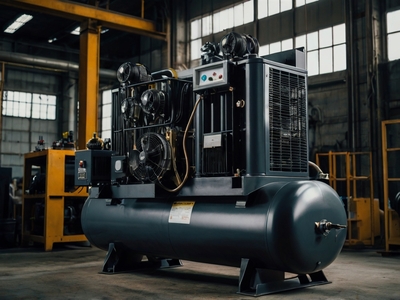Introduction
The Industrial Air Compressor Market is anticipated to experience significant changes by 2031, driven by evolving technologies, increased demand for energy efficiency, and the expansion of end-use industries. As industrialization continues to spread globally, the market is expected to adapt and grow, influenced by emerging trends that are shaping the future of air compression technologies.

Technological Advancements Leading the Way
One of the primary trends driving the industrial air compressor market is the continuous advancement in technology. Innovations such as variable-speed drive (VSD) compressors and oil-free technology are gaining popularity due to their efficiency and reduced environmental impact. VSD compressors adjust their motor speed according to demand, leading to substantial energy savings. This trend is likely to gain further traction as industries seek ways to minimize operating costs and comply with stricter environmental regulations.
Integration of IoT and Smart Technologies
The integration of Internet of Things (IoT) and smart technologies into industrial air compressors is revolutionizing the market. IoT-enabled compressors allow for real-time monitoring, predictive maintenance, and enhanced operational efficiency. By using sensors and connected devices, businesses can track compressor performance, detect potential issues before they lead to costly downtime, and optimize energy usage. This trend is expected to be a key driver of market growth, as more companies invest in smart industrial equipment to improve productivity.
Increasing Demand for Energy-Efficient Solutions
Energy efficiency is becoming a critical focus in the industrial air compressor market. As energy costs continue to rise and environmental concerns become more pressing, industries are looking for compressors that consume less power and offer greater efficiency. The demand for energy-efficient air compressors is particularly strong in regions where energy costs are high and regulations are stringent. This trend is pushing manufacturers to innovate and develop compressors that meet these demands while also reducing carbon footprints.
Growth in End-User Industries
The expansion of end-user industries, such as manufacturing, construction, and oil and gas, is another significant trend impacting the industrial air compressor market. In manufacturing, air compressors are essential for powering pneumatic tools, automated machinery, and conveying systems. The construction industry relies heavily on portable compressors for various on-site applications, including drilling and concrete spraying. As these industries grow, so too does the demand for reliable and efficient air compressors, driving market expansion.
Regional Trends and Market Dynamics
The industrial air compressor market is experiencing varying trends across different regions. The Asia-Pacific region is projected to see the highest growth by 2031, driven by rapid industrialization and increasing investments in infrastructure development. Countries like China, India, and Japan are leading the demand for air compressors, particularly in manufacturing and construction sectors. Meanwhile, North America and Europe are focusing on the adoption of advanced and energy-efficient technologies, driven by regulatory pressures and environmental initiatives.
Challenges and Market Restraints
Despite the positive trends, the industrial air compressor market faces several challenges. High initial costs and the complexity of maintaining advanced compressors can be barriers for small and medium-sized enterprises (SMEs). Additionally, the market is influenced by fluctuations in raw material prices, which can affect the overall cost of air compressors. Noise and vibration issues also pose challenges, as industries seek quieter and more stable solutions to comply with occupational safety standards.
Opportunities for Growth and Innovation
The future of the industrial air compressor market presents numerous opportunities for growth and innovation. The increasing adoption of automation and digital technologies in industrial processes is expected to boost demand for advanced air compressors. Furthermore, the rise of hybrid compressors, which combine different compression technologies for optimized performance, is likely to be a key trend in the coming years. The market also offers opportunities in the development of portable and compact compressors for use in remote and mobile applications.
Conclusion
The Industrial Air Compressor Market is on a dynamic path, shaped by trends in technology, energy efficiency, and industrial growth. While challenges such as high costs and regulatory pressures exist, the market is ripe with opportunities for innovation and expansion. As industries continue to evolve and prioritize efficiency and sustainability, the demand for advanced air compressors will remain strong, driving the market forward through 2031.
No responses yet